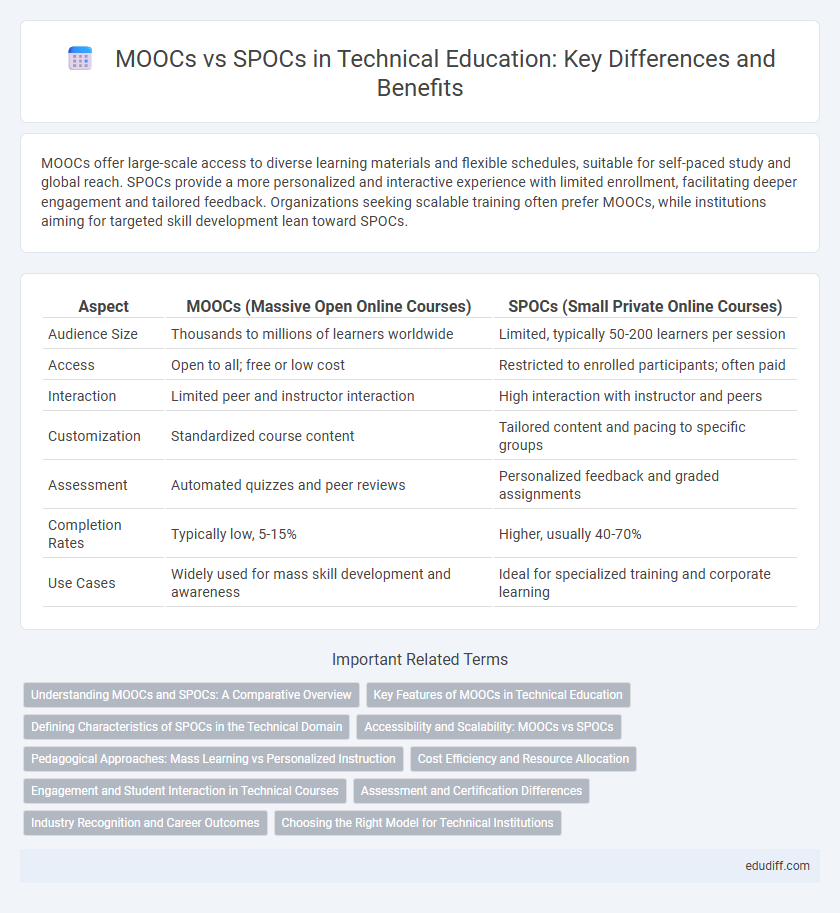MOOCs offer large-scale access to diverse learning materials and flexible schedules, suitable for self-paced study and global reach. SPOCs provide a more personalized and interactive experience with limited enrollment, facilitating deeper engagement and tailored feedback. Organizations seeking scalable training often prefer MOOCs, while institutions aiming for targeted skill development lean toward SPOCs.
Table of Comparison
| Aspect | MOOCs (Massive Open Online Courses) | SPOCs (Small Private Online Courses) |
|---|---|---|
| Audience Size | Thousands to millions of learners worldwide | Limited, typically 50-200 learners per session |
| Access | Open to all; free or low cost | Restricted to enrolled participants; often paid |
| Interaction | Limited peer and instructor interaction | High interaction with instructor and peers |
| Customization | Standardized course content | Tailored content and pacing to specific groups |
| Assessment | Automated quizzes and peer reviews | Personalized feedback and graded assignments |
| Completion Rates | Typically low, 5-15% | Higher, usually 40-70% |
| Use Cases | Widely used for mass skill development and awareness | Ideal for specialized training and corporate learning |
Understanding MOOCs and SPOCs: A Comparative Overview
Massive Open Online Courses (MOOCs) offer scalable, accessible learning opportunities to thousands of students simultaneously, leveraging diverse content and global instructors. Small Private Online Courses (SPOCs) provide a more personalized educational experience with limited enrollment, enabling targeted interaction and tailored feedback. Evaluating MOOCs against SPOCs reveals trade-offs between broad reach and individualized engagement in digital learning environments.
Key Features of MOOCs in Technical Education
MOOCs offer scalable online courses with flexible access to high-quality technical content from reputed institutions, enabling diverse learners worldwide to upskill at their own pace. They incorporate multimedia lectures, interactive quizzes, and peer-reviewed assignments to enhance engagement and knowledge retention in subjects like programming, data science, and engineering. These platforms often provide certification options, fostering professional development and career advancement in rapidly evolving technical fields.
Defining Characteristics of SPOCs in the Technical Domain
SPOCs in the technical domain offer personalized learning experiences with limited enrollment, enabling focused interactions and tailored feedback unlike the mass accessibility of MOOCs. They leverage specialized content designed for niche technical skills, often incorporating hands-on projects, live sessions, and direct instructor support. This format enhances learner engagement and skill mastery critical for complex technical subject matter.
Accessibility and Scalability: MOOCs vs SPOCs
Massive Open Online Courses (MOOCs) offer unparalleled scalability by enabling thousands of learners globally to access content simultaneously, ensuring widespread accessibility regardless of geographical constraints. In contrast, Small Private Online Courses (SPOCs) provide a more controlled environment with limited enrollment, enhancing personalized interaction but restricting scalability. The choice between MOOCs and SPOCs hinges on the desired balance between broad accessibility for diverse audiences and tailored, scalable learning experiences.
Pedagogical Approaches: Mass Learning vs Personalized Instruction
MOOCs utilize scalable pedagogical strategies designed for mass learning, emphasizing standardized content delivery and automated assessments to accommodate thousands of learners simultaneously. SPOCs prioritize personalized instruction through small cohort sizes, enabling tailored feedback, direct instructor interaction, and adaptive learning pathways that increase learner engagement and retention. The distinct instructional models reflect MOOCs' efficiency in broad access and SPOCs' effectiveness in depth of comprehension and skill mastery.
Cost Efficiency and Resource Allocation
MOOCs offer scalable cost efficiency by enabling thousands of learners to access content with minimal incremental expenses, whereas SPOCs require higher upfront investment per learner due to limited cohort sizes. Resource allocation in MOOCs favors automated grading and standardized content delivery, reducing the need for instructor intervention, while SPOCs demand more personalized support and interaction, increasing human resource costs. Institutions must balance the broad accessibility and low marginal costs of MOOCs against the targeted, resource-intensive nature of SPOCs to optimize budget and educational outcomes.
Engagement and Student Interaction in Technical Courses
MOOCs often struggle with limited student engagement due to large, impersonal class sizes, whereas SPOCs foster higher interaction through smaller groups and personalized feedback. Technical courses benefit from SPOCs by enabling real-time problem-solving sessions and collaborative projects, enhancing comprehension and retention. Empirical studies indicate SPOCs improve active participation rates by up to 40%, significantly impacting learning outcomes in complex technical subjects.
Assessment and Certification Differences
MOOCs often provide automated assessments with instant feedback accessible to global learners but generally issue certificates with limited formal recognition. SPOCs feature instructor-led evaluations and proctored exams, ensuring higher assessment reliability and personalized feedback. Certification from SPOCs tends to have greater academic and industry value due to controlled assessment conditions and alignment with specific institutional standards.
Industry Recognition and Career Outcomes
MOOCs (Massive Open Online Courses) offer broad accessibility but often lack formal accreditation compared to SPOCs (Small Private Online Courses), which provide targeted, industry-recognized certifications. Employers increasingly value SPOC credentials due to their alignment with specific job skills and demonstrated learner engagement. Career outcomes improve significantly through SPOCs, as they foster direct industry connections and practical expertise tailored to workforce demands.
Choosing the Right Model for Technical Institutions
Technical institutions must evaluate factors such as learner engagement, customization, and scalability when choosing between MOOCs and SPOCs. MOOCs offer broad access and cost-effectiveness, while SPOCs provide tailored content and foster interactive, cohort-based learning. Prioritizing the institution's specific educational goals and resource availability ensures the optimal model for skill development and technical knowledge acquisition.
MOOCs vs SPOCs Infographic

 edudiff.com
edudiff.com